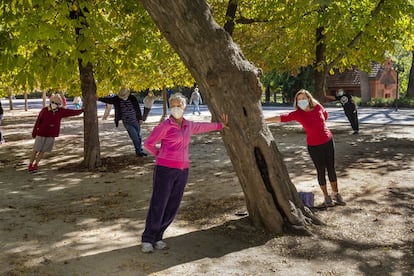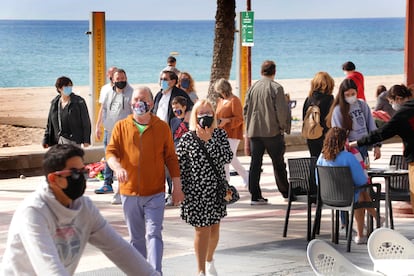Top-level scientists question obligatory use of face masks in open air and with social distancing
The principal health authorities stress that the essential requirement for avoiding coronavirus transmission is protection while indoors

Wearing a face mask outdoors and then putting it into your pocket when you enter a bar is like wearing a helmet to go for a walk and taking it off when you get on a motorbike. Despite this, it is common to see this paradox in many countries such as Spain, where it is mandatory to wear a face mask outside, but there are exceptions for indoor spaces such as restaurants and offices. But a growing number of leading experts have begun to question these contradictory measures, including Marc Lipsitch, the head of the Center for Communicable Disease Dynamics at Harvard University in the United States. “I am generally a hawk about maintaining rules with a clear benefit. Outdoor masking has notable costs and really no evidence of benefits,” he wrote on Monday in a message on Twitter.
I must agree. I am generally a hawk about maintaining rules with a clear benefit. Outdoor masking has notable costs and really no evidence of benefits https://t.co/tYTDm9slVX
— Marc Lipsitch (@mlipsitch) April 19, 2021
There has been substantial data on the issue of coronavirus contagion for a year now. A study of 318 coronavirus outbreaks in China, carried out at the beginning of the pandemic, found that 317 took place in indoor spaces. Only one of the 318 outbreaks happened outdoors when a 27-year-old man presumably caught the coronavirus in a town talking outside to a person who had recently arrived from Wuhan, where the virus was first identified. The European Center for Disease Prevention and Control (ECDC) only recommends that masks be worn in confined spaces, but “can be considered in crowded outdoor settings.” However, in Spain, face masks are mandatory even if a person is going for a walk by themselves in a park. Under the current rules, a mask must be worn in all public spaces, regardless of whether social distancing can be respected. On April 6, the Madrid Public Health Association (Amasap) called for an end to the “absurd” mandatory use of face masks in outdoor spaces.
The coronavirus is predominately spread through the air, via aerosols that build up like an invisible cloud when a person talks or coughs, according to new research published last week in the medical journal The Lancet. The authors of the study – led by doctor Trish Greenhalgh from Oxford University in the United Kingdom – say the way to prevent contagion is to: avoid being indoors with people from a different household, increase ventilation, use well-fitted masks in indoor spaces and reduce capacity.
“It is only necessary to wear a mask outdoors when we are doing strenuous exercise, such as running if we pass very close to someone, for example, on a sidewalk,” says Greenhalgh. “For everything else, it is not necessary to wear a face mask outdoors, because the virus quickly dissipates in the air. But if I breathe in the air you have just exhaled, I am at risk.”
Chemical engineer Martin Bazant, the creator of an interactive tool that calculates the risk of infection, says that the air transmission of the virus in enclosed spaces is the main cause of the spread of the pandemic. There is a peculiar dynamic to the coronavirus, in which some positive cases become superspreaders, while others do not even spread to the person they share a bed with every night. Bazant points out that all reported mass contagions have taken place indoors, such as the outbreak of 53 cases in a church choir in Mount Vernon, or the 23 people who were infected on a bus trip in Ningo, in China. In these enclosed and poorly ventilated spaces, wearing a face mask is crucial.
The likelihood of contagion outdoors is at least 20 times lower than indoorsOpen letter from Spanish health experts
Bazant, who works at the Massachusetts Institute of Technology, explains that “contagions outdoors have been extremely rare, even at the beginning of the pandemic, when nobody was wearing masks.” The engineer explains that when outdoors, the air exhaled from the mouth tends to be warmer than the surroundings, meaning it quickly rises and is blown away by the air currents. “A contagion could only be expected when people are very close to one another, a meter or less, and are speaking face to face, as happened in China in the only recorded case of transmission outdoors. And even then, the risk is much lower than in indoor spaces,” says Bazant, who adds “it’s time to stop using masks outdoors.”
US health authorities ask that face masks be used when indoors and on public transportation, but say they “may not be necessary when you are outside by yourself away from others, or with people who live in your household.” The World Health Organization (WHO) only recommends that masks be used when a safe distance of one meter cannot be maintained.
For the past year, researcher Lidia Morawska has led the scientific movement that convinced the world’s main health authorities of the importance of air transmission in the spread of the coronavirus. Like other leading scientists, Morawska is also convinced that face masks are not always needed when outdoors. “I have always said that outdoors, when one is moving and can maintain a reasonable distance, face masks are not necessary,” she explains. “For example, walking in the park, going for a run, riding a bicycle. However, we need masks outdoors if we are in a crowd or very close to other people.”

An international team of scientists published in January a review of the role of masks in the fight against the coronavirus. At the time, the authors suggested that the “use of widespread face masks in public” did reduce transmission of the virus. But the first author of the study, Jeremy Howard, a data scientist from San Francisco University, now says that “normally it is not necessary to wear a mask outdoors,” as long as there is a breeze and the person is walking or running.
Helene-Mari Van Der Westhuizen, one of the coauthors of the January study, also believes that face masks do not need to be worn on a walk where there are no crowds, but argues that there are still risks depending on the situation. “If I am going to an outdoor market filled with people, if I am running past someone in a narrow street or if I am going for a walk with my grandmother who hasn’t been vaccinated, then yes, clearly I would put on a mask,” says the researcher from Oxford University, who calls on health authorities to introduce these nuances in their recommendations. “Being outdoors is much safer than being indoors, but you have to continue to use the face mask if you can’t maintain a safe distance or if you are going to be in contact with a person from a group that is at risk of developing a serious case of Covid,” she says.
More than 100 Spanish experts signed an open letter on March 25 calling on authorities “to reconsider the recommendations for prevention,” given that “the likelihood of contagion outdoors is at least 20 times lower than indoors.” One of the scientists who signed the letter, chemist José Luis Jiménez, from the University of Colorado, explains that the letter avoided saying face masks were not necessary outdoors and with social distancing, because some public health experts feared the message could be misinterpreted as masks are never needed.
A spokesperson from the Spanish Health Ministry says that for now “all security measures will continue to be maintained” – including the mandatory use of face masks in public spaces, regardless of social distancing. One health expert argues it is better not to risk changing the rules until more of the population is vaccinated against Covid-19. In Israel, for example, the government announced this week that face masks no longer needed to be worn outdoors, but only after more than half the population was vaccinated. In Spain, 21% of the population has received at least one dose of the Covid-19 vaccine, but only 7.6% have received the two shots needed for full protection offered by the Oxford-AstraZeneca, Moderna and Pfizer-BioNTech medication.
English version by Melissa Kitson.
Tu suscripción se está usando en otro dispositivo
¿Quieres añadir otro usuario a tu suscripción?
Si continúas leyendo en este dispositivo, no se podrá leer en el otro.
FlechaTu suscripción se está usando en otro dispositivo y solo puedes acceder a EL PAÍS desde un dispositivo a la vez.
Si quieres compartir tu cuenta, cambia tu suscripción a la modalidad Premium, así podrás añadir otro usuario. Cada uno accederá con su propia cuenta de email, lo que os permitirá personalizar vuestra experiencia en EL PAÍS.
¿Tienes una suscripción de empresa? Accede aquí para contratar más cuentas.
En el caso de no saber quién está usando tu cuenta, te recomendamos cambiar tu contraseña aquí.
Si decides continuar compartiendo tu cuenta, este mensaje se mostrará en tu dispositivo y en el de la otra persona que está usando tu cuenta de forma indefinida, afectando a tu experiencia de lectura. Puedes consultar aquí los términos y condiciones de la suscripción digital.









































